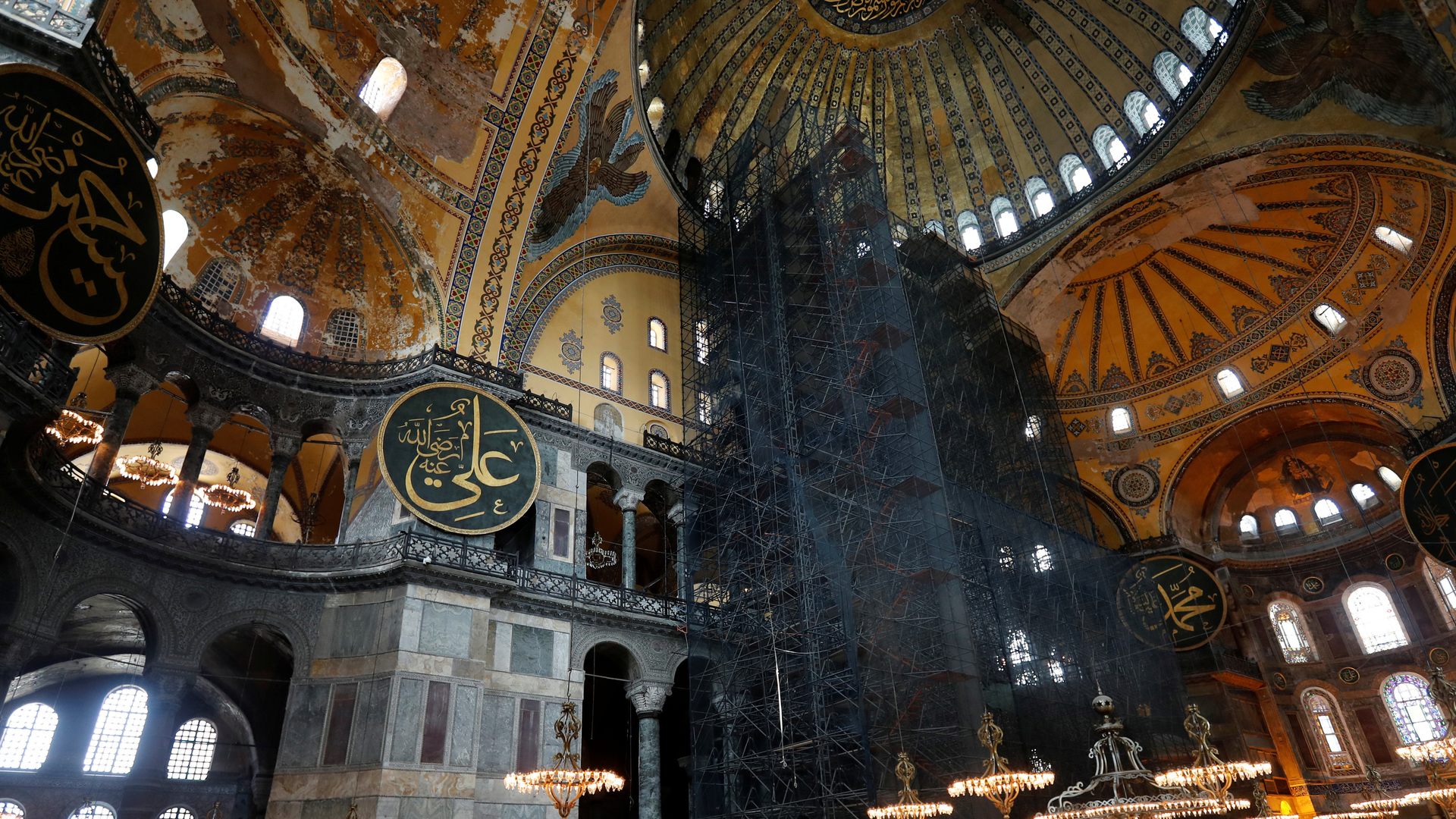On Friday, July 10, Turkish authorities decided to change the status of the symbol of the "golden age" of Byzantium - Hagia Sophia, built in the period from 532 to 537. Like several centuries ago, it again becomes a mosque.
As Anadolu agency indicates, Hagia Sophia in 1453 became the main mosque (Hagia Sophia) of the Ottoman state. Later, on November 24, 1934, this landmark of Istanbul received the status of a museum.
The State Council overturned the decree, emphasizing that Hagia Sophia is held as a mosque in the state real estate registry. This object belongs to the Sultan Mehmet Khan Foundation, the documentation of which indicated that the former museum can only be used as a mosque.
After that, President Recep Tayyip Erdogan signed a decree authorizing the opening of the Hagia Sophia mosque for worship. Later, the head of state turned to the nation in connection with the decision.
“Hagia Sophia falls under the jurisdiction of Turkey. I urge everyone to respect the decisions made by the judicial and executive bodies of Turkey. We accept any expression of views on this issue, with the exception of those aimed at violating our sovereignty, ”Erdogan emphasized.
Along with this, the Turkish leader recalled that 435 churches and synagogues are located in the republic. He also stressed that the object is the heritage of all mankind, and the doors of the mosque will always be open "for local residents and foreigners, Muslims and representatives of other religions."
“Upon completion of the preparatory measures, we plan to organize a service on July 24 in Hagia Sophia. Along with changing the status of the museum, the entrance fee to Hagia Sophia is also canceled, ”Erdogan said, adding that the transformation of the cathedral into a mosque will take about six months.
- Turkish President Recep Tayyip Erdogan
- © Mustafa Oztartan / Turkish Presidential Press Office / Handout via REUTERS
In the past, the museum, and now the Hagia Sophia mosque, is a symbol of the heyday of Byzantium - about 130 tons of gold was spent on its construction. The height is 55 meters and the diameter of the dome is 31 meters. For more than a thousand years, the cathedral remained the largest temple in the Christian world. Then this status was given to St. Peter's Basilica in Rome.
In 1985, the cathedral was recognized as a World Heritage Site by the United Nations Educational, Scientific and Cultural Organization. UNESCO Director General Audrey Azoulay deeply regretted the decision to change the status of Hagia Sophia “without prior dialogue”.
“The state in whose territory the object is located should not allow changes that encroach on the universal value of the monument. The state is obliged to notify UNESCO in advance of any modification, and if necessary, this issue should be submitted to the World Heritage Committee, ”TASS quoted it.
Azule emphasized that the cathedral is "an architectural masterpiece and unique evidence of the meeting of Europe and Asia for centuries."
- Hagia Sophia (now Hagia Sophia Mosque)
- Reuters
- © Murad Sezer
Chairman of the Synodal Department for Relations between the Church and Society and the Media of the Moscow Patriarchate Vladimir Legoyda said that “this decision, alas, is not aimed at reconciling the existing contradictions, but, on the contrary, can lead to even greater divisions,” as the Patriarch of Moscow and All previously said Russ Kirill.
“It is unfortunate that the concerns of the Russian Orthodox Church and other Orthodox churches have not been heard,” TASS quoted Legoid as saying.
In turn, the chairman of the Synodal Department for External Church Relations (DECR) of the Moscow Patriarchate, Metropolitan Hilarion of Alokey (Alfeev), stated that the issue of changing the status of Hagia Sophia will be discussed between the Russian Orthodox Church and the Office for Religious Affairs of Turkey.
“The decision that was made today, of course, was made under the influence of those radical Islamists who are gaining strength in modern Turkey. But we should probably not enter into a discussion regarding the internal situation of Turkey, but the fact that this event will undoubtedly affect both the attitude of the Russian people to the Turkish people and interreligious relations is already obvious, ”the Metropolitan said on the air of the channel "Russia 24".
We add that a number of countries on the European continent reacted negatively to the decision of the Turkish authorities. While the EU High Representative for Foreign Affairs, Josep Borrell, simply expressed regret at the change of status of the object, which has great “symbolic, historical and universal value,” the representatives of Greece, Cyprus and Austria openly criticized Istanbul.
- Muslims perform evening prayers near the Hagia Sophia Mosque (formerly Hagia Sophia)
- Reuters
- © Murad Sezer
The Minister of Culture and Sports of Greece Lina Mendoni described the incident as "an open challenge to the entire civilized world." In turn, the head of the Greek Foreign Ministry, Nikos Dendias, called this a provocation from Turkey. His Cypriot counterpart, Nikos Hristodulidis, stated that Turkish authorities have blatantly violated their international obligations.
“We deeply regret the decision of Turkey today to turn Hagia Sophia into a mosque and we cannot understand this. The cancellation of the status of a museum open to all cultures and religions is the next step from Europe, ”said Austrian Foreign Minister Alexander Schallenberg in a statement.

